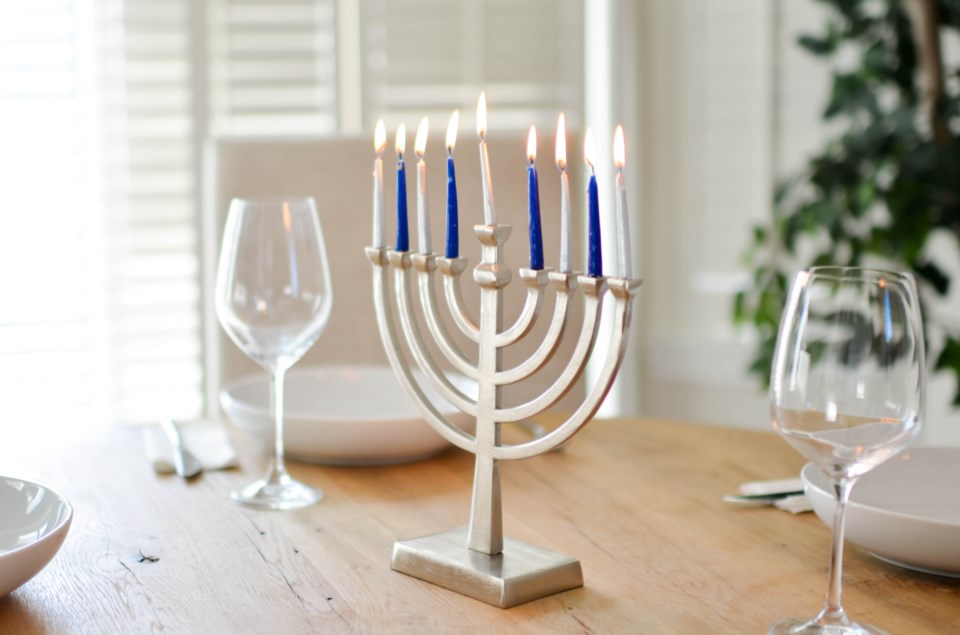 At sundown on December 22 Jews all over the world will light their menorahs and say blessings for the first night of Chanukah. For the next eight days, through our prayers and candles, we will remember the rededication of the Second Temple in Jerusalem, when a small group of Jews led by the priestly Maccabee family fought hard and won the right to practice their faith. (See Light Up the Darkness, for more on the history and miracle of the Chanukah).
At sundown on December 22 Jews all over the world will light their menorahs and say blessings for the first night of Chanukah. For the next eight days, through our prayers and candles, we will remember the rededication of the Second Temple in Jerusalem, when a small group of Jews led by the priestly Maccabee family fought hard and won the right to practice their faith. (See Light Up the Darkness, for more on the history and miracle of the Chanukah).
Traditional activities for Chanukah include lighting the menorah, eating foods fried in oil, and giving children real and/or chocolate coins called gelt (Yiddish for money). We eat the chocolate coins and use the real coins to buy something special, or we put them in a tzedakah box to be donated to a local charity or synagogue.
When I was growing up, we always had a tzedakah box on the hall table. My siblings and I received a small allowance each week-- five cents for each year of our lives--so, when I was seven, I got 35 cents a week (equal to $2.50/week today). Each week, we were taught to put 10% of our allowance into the tzedakah box. When the box was full, my father would take the money to the appropriate charity and we would start again with an empty box.
I loved to pick up the box and shake it every now and then to see how we were doing. Unlike the ornamental banks we each had for savings, there was no way to take the money out of our tzedakah box except by using a can-opener, so once we put our money in, we could not change our minds. The word tzedakah is often translated as charity, but the literal translation is justice, having to do with social justice and taking care of those in need. The simple irreversible act of putting our precious coins into the tzedakah box, taught us the importance of committing to a course of action in the service of others.
On December 24, Christmas celebrations (secular and religious) will officially begin. On December 25, families who practice gift-giving will gather around Christmas trees, open brightly wrapped presents, and dig into the bottom of store-bought and handmade stockings filled with chocolates and other treats. Families and friends will gather for festive meals and to catch up on what has happened during 2019. On Boxing Day, many families will donate gently used toys and clothes to agencies that then distribute these gifts to families in need.
This year, Christmas and Boxing Day occur right in the middle of Chanukah. When this happens, interfaith families create their own traditions for decorating their homes, hosting holiday meals, giving gifts, and teaching their children about the underlying themes of love, peace, acts of kindness, and giving to those in need. In my family, we give small personal presents each night of Chanukah and then for Christmas get something for the house that everyone can use.
We are stronger when we all celebrate together and honour each other's traditions. We are stronger when we practice social justice. I feel blessed to live in a place where we can share and be proud of who we are. If you would like to join us for our public Chanukah celebrations, in Victoria, we'll gather in front of the Legislature on December 22 at 3:30 pm. Outside of Victoria, check your local newspapers or social media sites for times near where you live.
Public menorah lighting times: (https://www.chabadvi.org/templates/articlecco_cdo/aid/4559163/jewish/Legislature-Lighting.htm)
 For more from Fiona Prince, you may like to read Holiday Mash-ups: Chrismukkah, Hannukmas and Festivus for the Rest of Us
For more from Fiona Prince, you may like to read Holiday Mash-ups: Chrismukkah, Hannukmas and Festivus for the Rest of Us
You can read more articles on our interfaith blog, Spiritually Speaking, HERE
Photo of Chanukah candles by Element5 Digital on Unsplash


